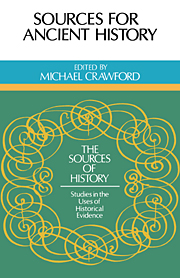3 - Archaeology
Published online by Cambridge University Press: 06 January 2010
Summary
Nowhere are the distinctive assets and liabilities of archaeology as a source shown up so conspicuously as in Greek and Roman history. While the decisive theoretical battles of archaeology have long been fought out on other fields and between bigger battalions, it is in the closer encounters of Classical archaeology that the more continuous attrition of empirical testing takes place. The experience has not had much influence on wider archaeological thought, but it has revealed certain assets on the part of archaeological evidence in an historical context: four of these, which I would single out as the most important, are its independence, its directness, its experimental character, and its unlimited potential for future extension. None of these qualities should be understood as implying objectivity. In so far as the ideal of total objectivity can be pursued at all, it is no more at the command of the archaeologist than of the historian. Less widely acknowledged, but in the long run just as important, are the peculiar liabilities of archaeological evidence. It is impossible simply to give a list of these; a great part of the discussion in this chapter arises from their existence. But one can say at the outset that archaeological evidence particularly lends itself to misunderstanding of one form or another: occasionally, to misunderstanding by the archaeologist of the identity of what he himself has discovered; much more often, to his misunderstanding of the meaning of his own and others' discoveries; equally frequently, to misunderstanding by historians of what is the scope of permissible inference from archaeological data in general or from a particular discovery. To these and other failures of understanding and communication, we must turn presently.
- Type
- Chapter
- Information
- Sources for Ancient History , pp. 137 - 184Publisher: Cambridge University PressPrint publication year: 1983
- 1
- Cited by

